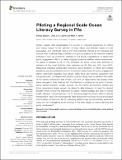Files in this item
Piloting a regional scale Ocean Literacy survey in Fife
Item metadata
| dc.contributor.author | Spoors, Felicity | |
| dc.contributor.author | Leakey, Chris D. B. | |
| dc.contributor.author | James, Mark Andrew | |
| dc.date.accessioned | 2022-03-09T16:48:29Z | |
| dc.date.available | 2022-03-09T16:48:29Z | |
| dc.date.issued | 2022-03-09 | |
| dc.identifier | 277843373 | |
| dc.identifier | bfbfe53b-d218-446f-b388-b2f9bb53bbc3 | |
| dc.identifier | 85127328517 | |
| dc.identifier | 000798719900001 | |
| dc.identifier.citation | Spoors , F , Leakey , C D B & James , M A 2022 , ' Piloting a regional scale Ocean Literacy survey in Fife ' , Frontiers in Marine Science , vol. 9 , 858937 . https://doi.org/10.3389/fmars.2022.858937 | en |
| dc.identifier.issn | 2296-7745 | |
| dc.identifier.other | ORCID: /0000-0002-7182-1725/work/109766607 | |
| dc.identifier.other | ORCID: /0000-0002-5547-9595/work/109766907 | |
| dc.identifier.uri | https://hdl.handle.net/10023/25018 | |
| dc.description | This research was funded by the St Andrews Restarting Interdisciplinary Research Fund as part of the broader Fife Sustainable Natural and Cultural Coastal Zone Project (Grant code: SES0-XRR074). The Article Processing Charge was kindly covered by the University of St Andrews’ Institutional Open Access Fund (IOAF). | en |
| dc.description.abstract | Ocean Literacy (OL) encapsulates the journey of improved awareness of marine and coastal issues, to the adoption of clear values and attitudes based on that knowledge, and intentional lifestyle and other personal choices at an individual and societal level. Understanding a community or group’s position in this transition enables institutions, such as universities, charities or civil society organisations, to target their public engagement efforts to make progress towards a healthier marine environment. To gather a baseline of OL in Fife, Scotland, an online survey was launched to residents of the Local Authority Area, between the 8th May and 30th June 2021. Responses indicated widespread uncertainty about solutions to marine and coastal problems, prompting the promotion of a solutions-based focus for public engagement efforts, particularly regarding local issues. While there was common agreement that the government, businesses and citizens could be doing more to advance the health of the marine environment and climate, only 55% of respondents had already made some changes to their lifestyles with the intention to continue at the point of survey. Some barriers evidently remain. Concern for the marine environment, climate and future generations largely govern the desire to alter behaviour to reap the desired benefits which include the enjoyment of nature, cultural heritage and aids to mental health. Taking a ‘nested approach’ to OL surveying is likely to improve response rates and amplify the voices of rural and coastal communities. Furthermore, the OL surveying platform may opportunistically serve as a useful tool for investigating public priorities in the early stages of marine planning and policy development. | |
| dc.format.extent | 15 | |
| dc.format.extent | 2475095 | |
| dc.language.iso | eng | |
| dc.relation.ispartof | Frontiers in Marine Science | en |
| dc.subject | Ocean Literacy | en |
| dc.subject | Public awareness | en |
| dc.subject | Behavioural change | en |
| dc.subject | Climate-related behaviours | en |
| dc.subject | Marine planning tools | en |
| dc.subject | Scotland | en |
| dc.subject | QH301 Biology | en |
| dc.subject | E-DAS | en |
| dc.subject | SDG 3 - Good Health and Well-being | en |
| dc.subject | SDG 13 - Climate Action | en |
| dc.subject | SDG 14 - Life Below Water | en |
| dc.subject.lcc | QH301 | en |
| dc.title | Piloting a regional scale Ocean Literacy survey in Fife | en |
| dc.type | Journal article | en |
| dc.contributor.institution | University of St Andrews. School of Biology | en |
| dc.contributor.institution | University of St Andrews. Centre for Energy Ethics | en |
| dc.contributor.institution | University of St Andrews. Coastal Resources Management Group | en |
| dc.contributor.institution | University of St Andrews. Marine Alliance for Science & Technology Scotland | en |
| dc.identifier.doi | 10.3389/fmars.2022.858937 | |
| dc.description.status | Peer reviewed | en |
This item appears in the following Collection(s)
Items in the St Andrews Research Repository are protected by copyright, with all rights reserved, unless otherwise indicated.

